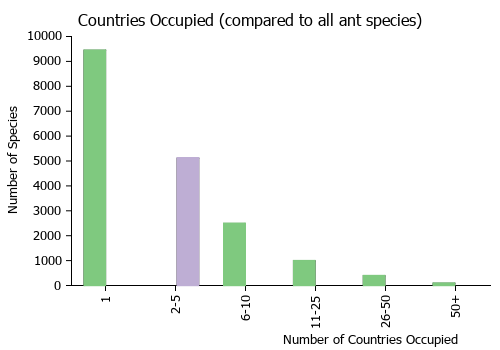Pheidole seeldrayersi
| Pheidole seeldrayersi | |
|---|---|

| |
| Scientific classification | |
| Kingdom: | Animalia |
| Phylum: | Arthropoda |
| Class: | Insecta |
| Order: | Hymenoptera |
| Family: | Formicidae |
| Subfamily: | Myrmicinae |
| Tribe: | Attini |
| Genus: | Pheidole |
| Species: | P. seeldrayersi |
| Binomial name | |
| Pheidole seeldrayersi Forel, 1910 | |
Nothing is known about the biology of seeldrayersi.
Identification
See the description in the nomenclature section.
Keys including this Species
Distribution
Colombia, and one series from near Flor de Oro, Santa Cruz, Bolivia, 450 m (P. S. Ward). Kempf (1972b) reports the species from Catamarca, Argentina, a surprising record that needs to be confirmed. (Wilson 2003)
Distribution based on Regional Taxon Lists
Neotropical Region: Argentina, Bolivia, Colombia (type locality).
Distribution based on AntMaps
Distribution based on AntWeb specimens
Check data from AntWeb
Countries Occupied
| Number of countries occupied by this species based on AntWiki Regional Taxon Lists. In general, fewer countries occupied indicates a narrower range, while more countries indicates a more widespread species. |

|
Estimated Abundance
| Relative abundance based on number of AntMaps records per species (this species within the purple bar). Fewer records (to the left) indicates a less abundant/encountered species while more records (to the right) indicates more abundant/encountered species. |

|
Biology
Castes
Worker
Minor
Images from AntWeb
   
| |
| Paralectotype of Pheidole seeldrayersi. Worker. Specimen code casent0908149. Photographer Z. Lieberman, uploaded by California Academy of Sciences. | Owned by MHNG, Geneva, Switzerland. |
Nomenclature
The following information is derived from Barry Bolton's Online Catalogue of the Ants of the World.
- seeldrayersi. Pheidole seeldrayersi Forel, 1910a: 30 (s.w.q.) COLOMBIA. See also: Wilson, 2003: 229.
Unless otherwise noted the text for the remainder of this section is reported from the publication that includes the original description.
Description
From Wilson (2003): A medium-sized, yellowish brown member of the diligens group with long, erect pilosity, close to Pheidole coffeicola and Pheidole variegata (= Pheidole pubiventris), differing, as figured, in the major class by its shorter scapes, denser pilosity, triangular and pointed mesonotal convexity in side view, and more extensive cephalic rugoreticulum, which rugoreticulum stretches from the eyes to the circular carinulae surrounding the antennal fossae. See also the less similar Pheidole laevifrons, Pheidole laevinota, Pheidole pubiventris and Pheidole rufipilis.
MEASUREMENTS (mm) Lectotype major: HW 1.28, HL 1.28, SL 0.88, EL 0.20, PW 0.64. Paralectotype minor: HW 0.64, HL 0.74, SL 0.96, EL 0.18, PW 0.44.
COLOR Major: body and appendages yellowish brown, with the gaster a darker shade.
Minor: concolorous yellowish brown.
Figure. Upper: lectotype, major, including views from rear of both mesonotal convexity and petiolar node. Lower: paralectotype, minor. Scale bars = 1 mm.
Type Material
COLOMBIA: no further locality. Musee d'Histoire Naturelle Genève - as reported in Wilson (2003)
Etymology
Eponymous. (Wilson 2003)
References
- Forel, A. 1910a. Glanures myrmécologiques. Ann. Soc. Entomol. Belg. 54: 6-32 (page 30, soldier, worker, queen described)
- Kempf, W. W. 1972b. Catálogo abreviado das formigas da região Neotropical. Stud. Entomol. 15: 3–344.
- Wilson, E. O. 2003. Pheidole in the New World: A dominant, hyperdiverse ant genus. Harvard University Press, Cambridge, MA. (page 229, fig. major, minor described)
References based on Global Ant Biodiversity Informatics
- Bruch C. 1914. Catálogo sistemático de los formícidos argentinos. Revista del Museo de La Plata 19: 211-234.
- Cuezzo, F. 1998. Formicidae. Chapter 42 in Morrone J.J., and S. Coscaron (dirs) Biodiversidad de artropodos argentinos: una perspectiva biotaxonomica Ediciones Sur, La Plata. Pages 452-462.
- Fernández F., E. E. Palacio, W. P. Mackay, and E. S. MacKay. 1996. Introducción al estudio de las hormigas (Hymenoptera: Formicidae) de Colombia. Pp. 349-412 in: Andrade M. G., G. Amat García, and F. Fernández. (eds.) 1996. Insectos de Colombia. Estudios escogidos. Bogotá: Academia Colombiana de Ciencias Exactas, Físicas y Naturales, 541 pp
- Fernández, F. and S. Sendoya. 2004. Lista de las hormigas neotropicales. Biota Colombiana Volume 5, Number 1.
- Forel A. 1910. Glanures myrmécologiques. Ann. Soc. Entomol. Belg. 54: 6-32.
- Forel A. 1912. Formicides néotropiques. Part III. 3me sous-famille Myrmicinae (suite). Genres Cremastogaster et Pheidole. Mémoires de la Société Entomologique de Belgique. 19: 211-237.
- Kempf, W.W. 1972. Catalago abreviado das formigas da regiao Neotropical (Hym. Formicidae) Studia Entomologica 15(1-4).
- Kusnezov N. 1978. Hormigas argentinas: clave para su identificación. Miscelánea. Instituto Miguel Lillo 61:1-147 + 28 pl.



